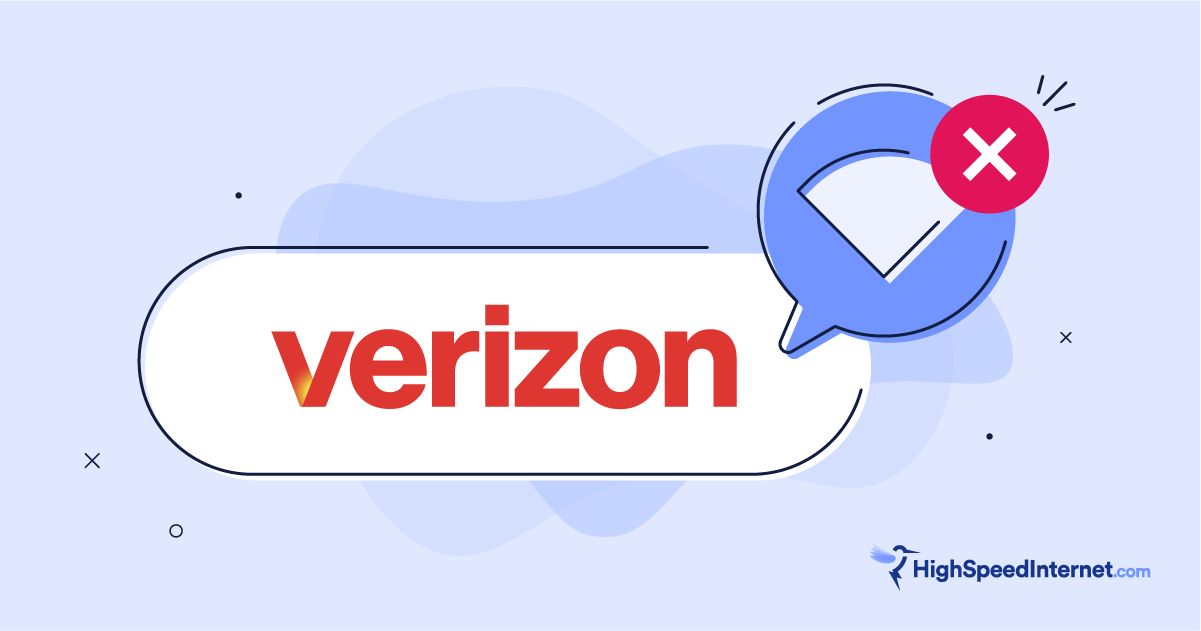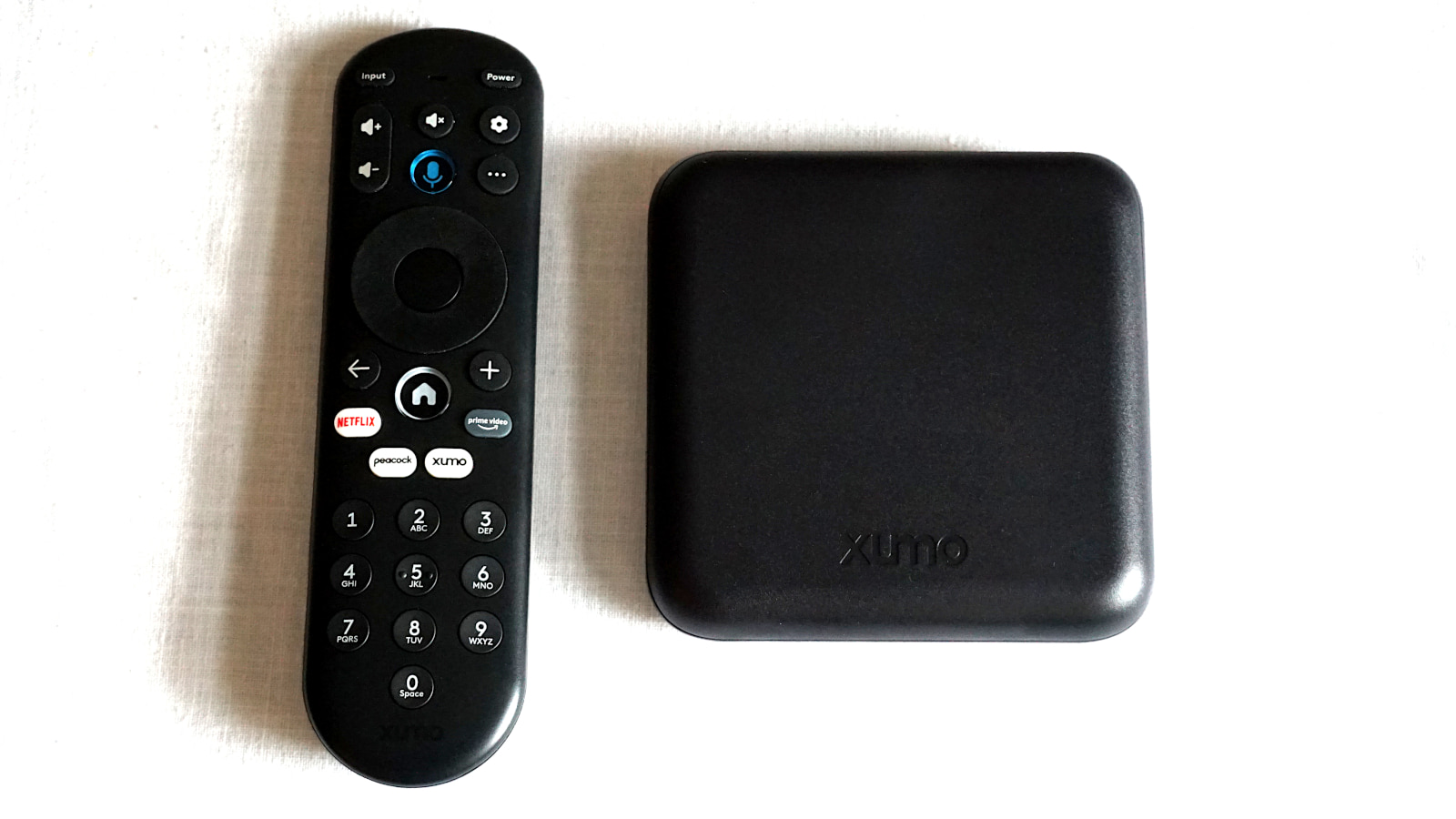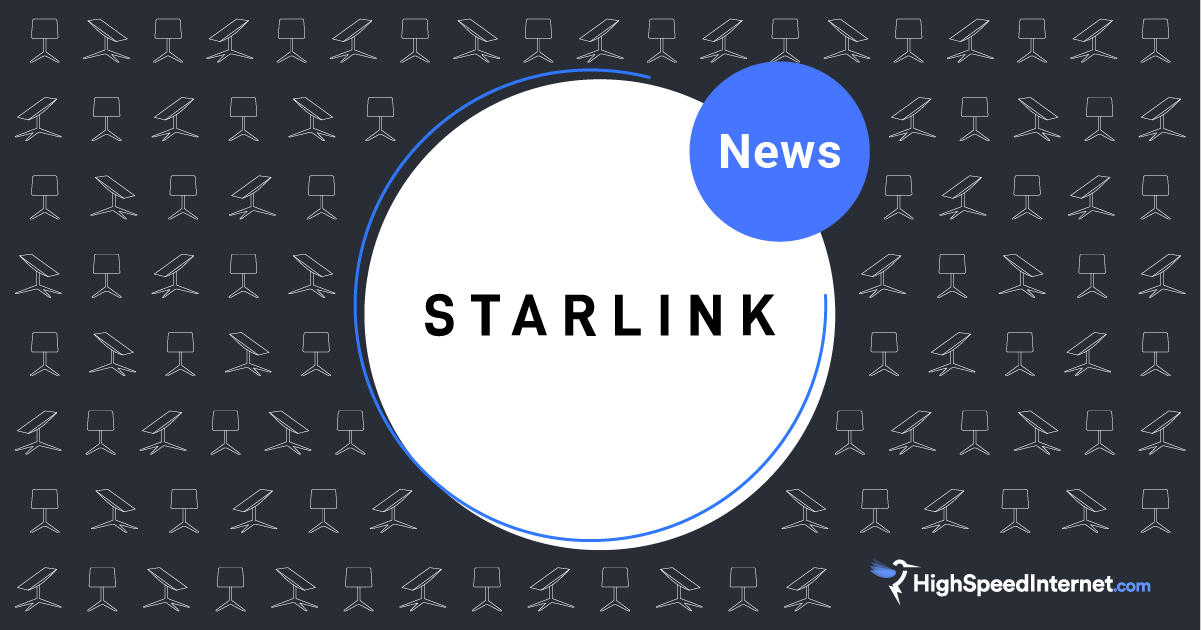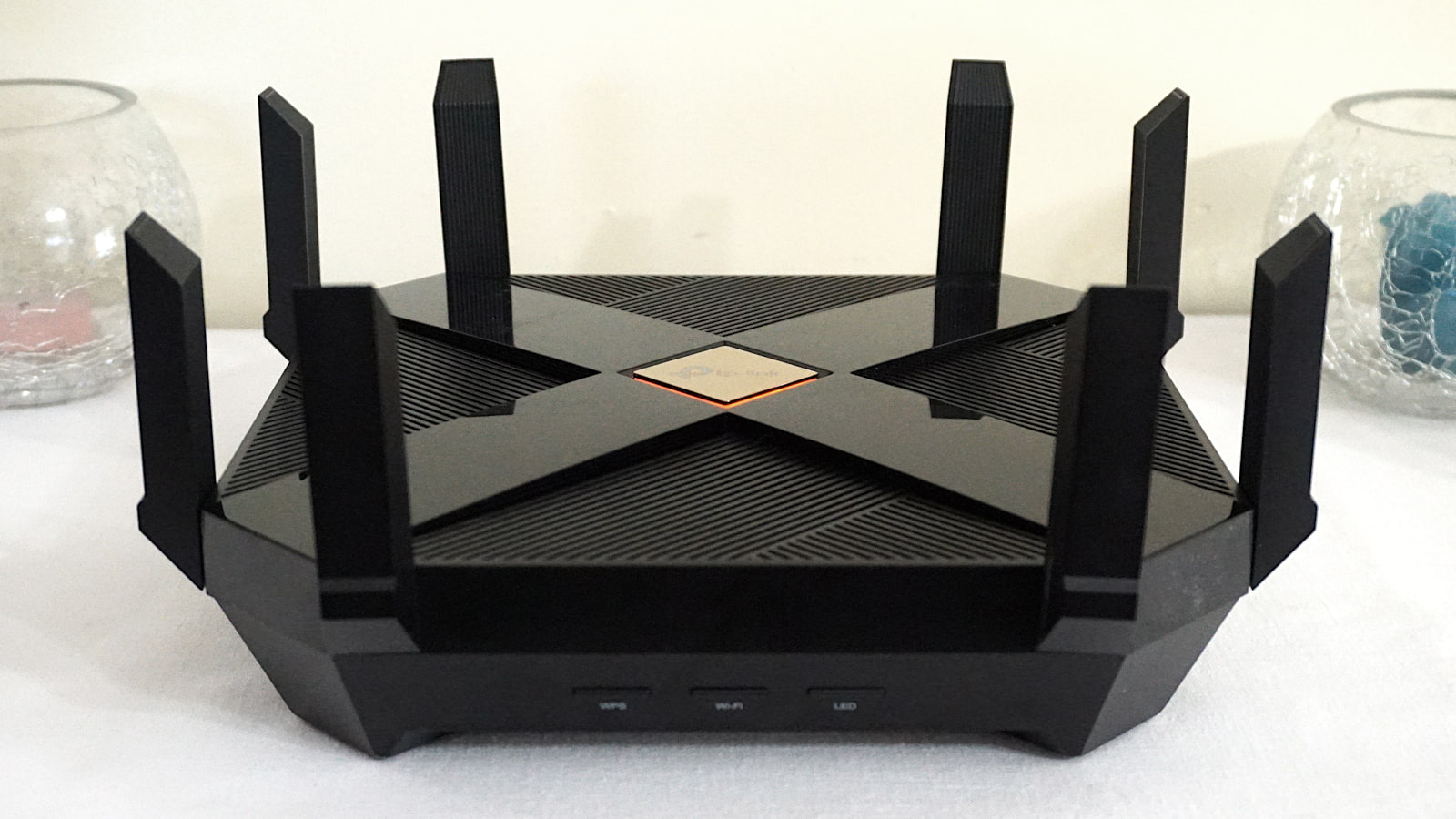Is Starlink Internet Down?
What to do if you can't get your Dish to connect
Feb 4, 2026 | Share
Brand Guides, Equipment Guides, Internet Outage
True Starlink outages are rare: The last one we saw was in July 2025, but the one before that was all the way back in May 2024. Both lasted less than an hour. However, connection problems with individual Starlink Residential and Mini dishes are common.
Mini-outages of two minutes or less can occur when your connection changes to a different satellite overhead, for instance. You can also be down for 20 to 60 minutes if your dish is rebooting or your system needs a software update. You will also experience slow speeds and outages if your dish doesn’t have a stable power source or if there are too many obstructions between your dish and the northern sky.
It’s frustrating, but there’s a lot you can do to restore your Starlink signal and get reconnected quickly.
Starlink connection issues got you down? Find a new provider.
Enter your zip code to compare alternatives in your area.
On this page:
Quick tips | In-depth troubleshooting | Refund information | Leave a review | What customers say | Starlink reliability stats | Service interruptions to expect | How Starlink compares | FAQ | My take
On this page:
Four things you can do to find out if Starlink internet is down
You might be in a Starlink outage if you’re having trouble streaming, accessing sites, or checking email. Follow these troubleshooting steps to find out what’s happening:
Step 1: Try to get on Starlink internet with a different phone, laptop, or streaming device.
Step 2: Check your Starlink app for alerts about outages, obstructions, and more.
Step 3: Check your Starlink router or Mini dish for power and connection status.
Step 4: Disconnect and reconnect your Starlink equipment from a power source and wait 20 minutes for it to reboot.
How to check the lights on your Starlink Mini dish or Gen 3 router
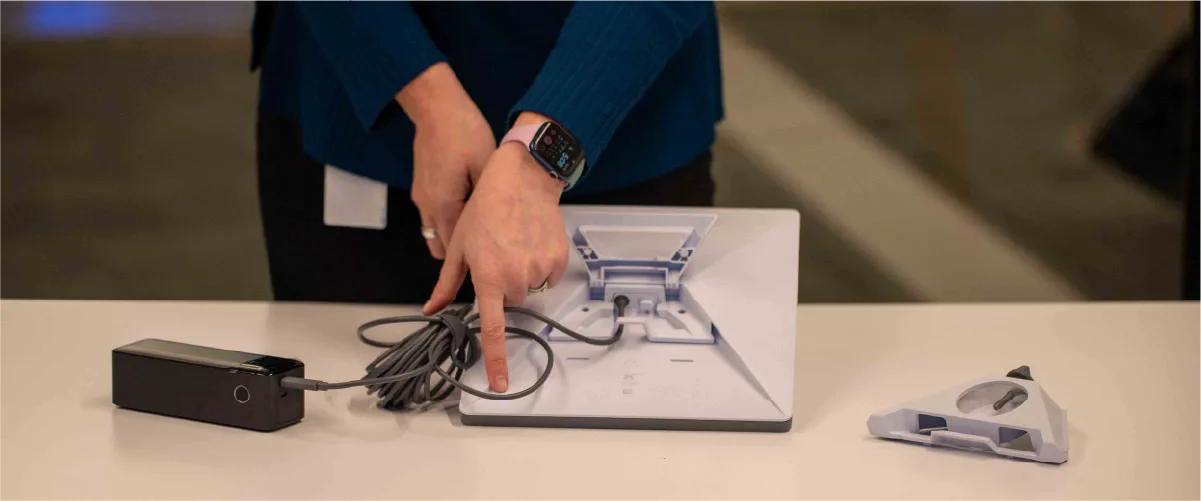
If you’re working with the Starlink Mini, check whether it’s powered on by looking for a tiny blue light on the back of the dish. You can also listen carefully for electrical sounds to see if the dish is operational.
If you have a standard Starlink kit, check the router for connection status. On the Generation 3 Router (the most common model), there are two lights to spot.
Here’s what to look for on the connection status light:
- White: Dish is connected (on for the first hour only)
- Blinking white: Setup is underway
- Violet: Router is in bypass mode (on for the first hour only)
- Red: Dish has power but is not connected to the internet
A separate LED on the lower front of the router will also show power status.
Read more about Starlink router status lights.
In-depth Starlink troubleshooting
If these steps don’t get you back up and running, read below for Starlink-specific tips and tricks.
Pull up your account
If you still can’t get online with Starlink, check the account section of your app to make sure your account is current. If you’re on a Residential plan, you should also check to see whether the address is correct and ensure you’re trying to connect at that address. If you need to connect from a different location, you may need to upgrade to a Roam plan.
Check your cables
If everything looks good on your account but you still can’t get online, carefully check the length of your cables for signs of damage, then unplug them and plug them back in, and recheck your status lights.
Move or reset your equipment
Sometimes, your Dishy just needs a fresh start. That might mean a new location, so give it a try. Instructions in the app can help you ensure proper alignment.
If a relocation doesn’t fix things, reset your Starlink to factory settings so you can start with a new network name.
Consider bypassing the router
If nothing else works, there could be an issue with your router (either the built-in one on the Mini or the separate one with a Standard setup). Try hardwiring a laptop to your Starlink router with an Ethernet cable. You can buy a custom cable from Starlink or force a third-party cable into the port. Just be warned, a non-standard cable won’t be weather-proofed, might be difficult to remove later, and could damage your port.
Last resort? Contact Starlink
If you still can’t get a solid connection status, call for help. Start a ticket within the help section of the Starlink app or call +1-866-606-5103 in the U.S. for phone support. The line is open from 6 a.m. to 4 p.m. CT.
Get even more ways to contact Starlink.
Refunds for Starlink outages
Starlink doesn’t offer refunds for outages and doesn’t guarantee speeds or uptime, according to its terms and conditions, but you can send everything back with no questions asked within your first 30 days of service. You’ll get all your money back, except what you paid for shipping and handling.
Leave a review about your Starlink service
Expert opinions are great, but real customer stories can be even more compelling. If you’re a Starlink customer, tell us about your experience, then see what other customers have to say.
Starlink customer feedback
We’ve talked to hundreds of Starlink customers over the years, both as part of our customer service survey and in one-on-one interviews.
Many people say they had no other way to get reliable internet and were delighted when they finally signed up for Starlink. We also heard price and speed complaints from customers in congested areas.
“Starlink is cost efficient and able to provide service when only one other company would offer it (at double the price and less speed). Starlink was quick on mailing their products. The equipment is condensed and sharp looking.”
“Because we live in a rural area, our ISPs were very limited. We awaited Starlink with great anticipation. Our speeds went from 7-10 Mbps to 114 Mbps. Our outages have been extremely few and very short-lived.”
“Living in a rural area, it is very nice to have Starlink. All you need is their satellite and a few small boxes, and you’re ready to go. The down sides? Over $100 a month. It’s very expensive for what you get. We often have outages.”
“Starlink is amazing. I live in a rural area and they are the first provider that has actually been able to give us high speed internet. Others have promised, but they are the first to deliver.”
Sourced from the Customer Satisfaction Survey and HighSpeedInternet.com customer reviews. We did not require reviewers to leave their names or other personal info.
Starlink customers report fewer outages than the national average
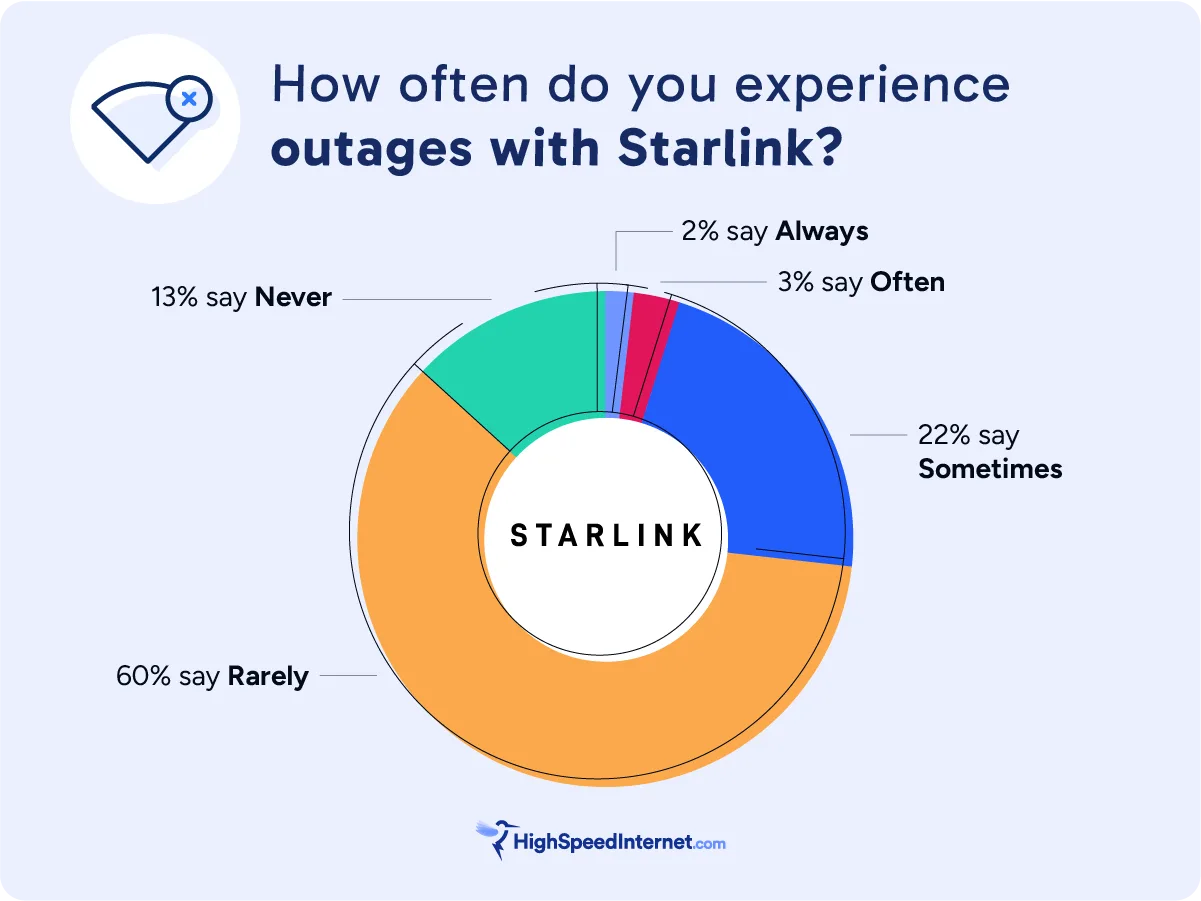
It’s nice to know how to fix connection problems on your own Dishy, but we also wanted to see the big picture. We talked to thousands of internet customers nationwide.
Our findings were a pleasant surprise: Starlink customers reported fewer outages than the average internet customer nationwide. Where only 2% of Starlink customers say they always have outages, for example, that’s true of 9% of all internet customers across the U.S.
In keeping with that trend, only 59% of internet customers overall say they “rarely” or “never” experience outages, compared to 73% of Starlink customers who say the same.
Get your Starlink setup right, and you can expect fewer problems than you would with other internet providers.
The Starlink network as a whole is highly reliable, but your mileage may vary based on your setup and how many other customers live near you.
Overall, though, we think you’ll enjoy your experience with Starlink.
Among all the people we surveyed, 77% were “very” or “completely” satisfied with Starlink’s reliability, and 66% were “very” or “completely” satisfied with speeds.
Looking for Starlink alternatives in your area?
Run your zip code to see your options.
Check your internet connection speed
If you’re not sure whether you’re experiencing an outage or slowdown on your Starlink connection and can’t get to the Starlink app on the account holder’s smartphone, check your speed below.
Download speed
000 Mbps
Upload speed
000 Mbps
Latency (ping)
00 ms
Jitter
00 ms
You can run a speed test using our mobile app, too!
Starlink service interruptions to expect
While Starlink is rarely down system-wide, slowdowns and intermittent outages are common. Read on to learn what you can expect.
Congestion-related slowdowns (especially during peak hours)
Starlink uses thousands of satellites in low-Earth orbit to help connect its customers to the internet, but you can still face slowdowns if there are too many customers trying to get online at once. These can be caused by the following:
- The limited capacity of the radio waves Starlink has the rights to use
- The limited number of satellites in orbit at any given time
- The limited number of ground stations that transmit your signal from satellites overhead to the rest of the global internet
Congestion issues can happen anytime, but they increase if your area is oversubscribed. It’s already happening in places like Washington and North Carolina, where Starlink is imposing demand surcharge fees of up to $1,000 for new customers.
Existing customers in those areas also face slowdowns, especially during busy evening hours.
“Peak hours are the times during the day when many Starlink users are trying to use their service at the same time (typically between 6 p.m. and 11 p.m. local time),” reads the Starlink help guide. “While we do our best to optimize performance for all users, you may experience varying or slower speeds during these times of peak usage.”
Obstruction-related slowdowns or outages
Having anything between your receiver dish and the Starlink satellites can cause slowdowns or intermittent outages. Sometimes, these obstructions can be as seemingly innocuous as storm clouds passing overhead. More commonly, though, they’re trees, mountains, or buildings.
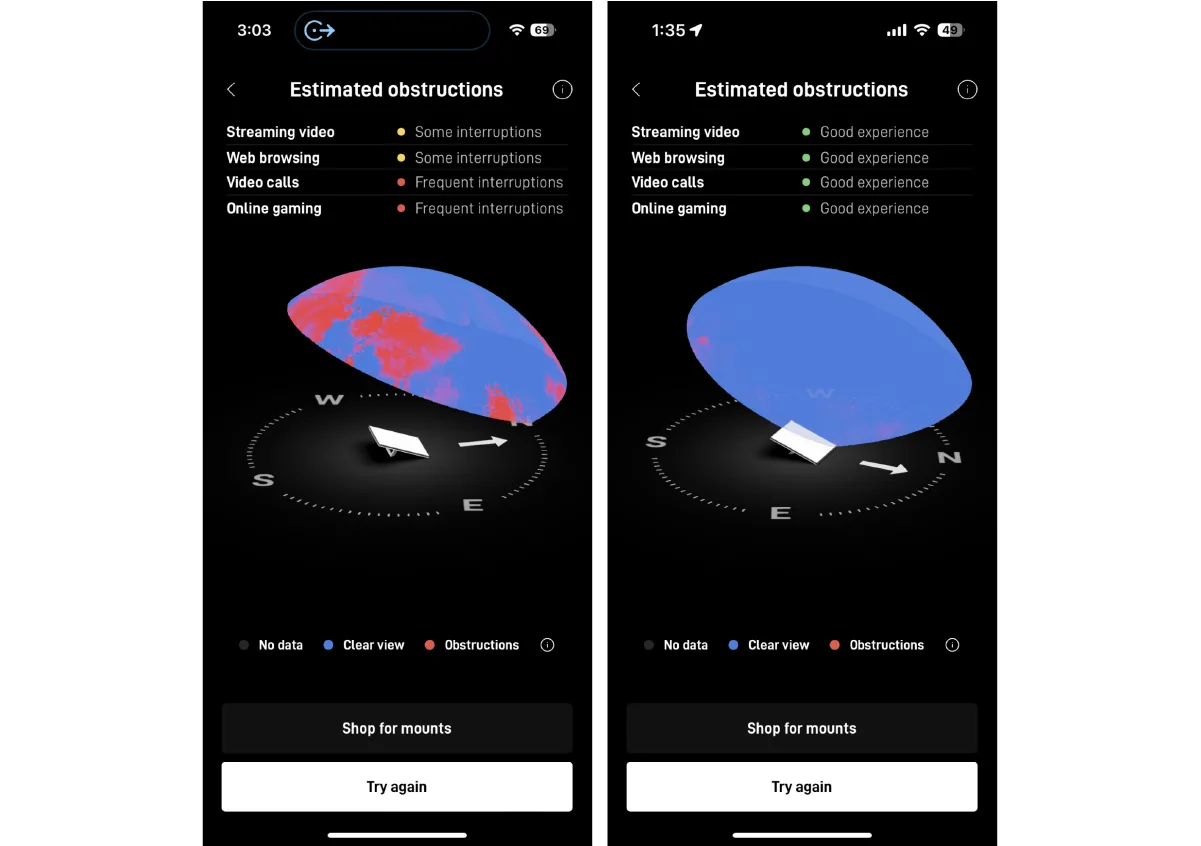
Either way, the best fix is to reposition your dish. Instructions in the Starlink app will help you ensure proper alignment.
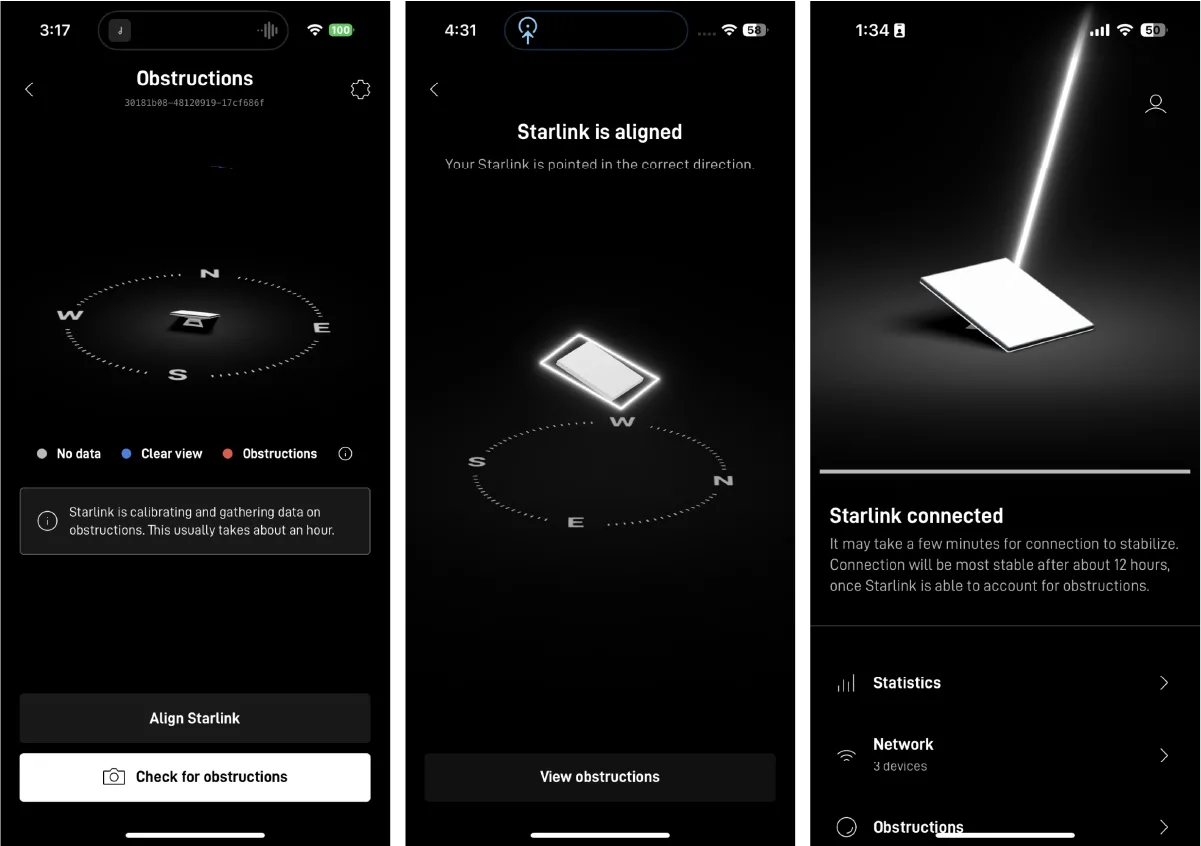
Power-related outages
Your Starlink network will fail anytime your dish doesn’t have an adequate power supply. This is mostly an issue for RVers or people with a Mini dish, but it can also impact people with Residential service in case of a power outage or faulty wiring.
One Starlink customer on Reddit recommends lightly coating cables and connections with dielectric grease to protect them from weather-related problems like corrosion, oxidation, and condensation.
Should you change your Starlink plan?
There are two instances where upgrading your Starlink plan may help resolve your issues with slowdowns. First, you may be on a deprioritized connection, such as a Roam plan or the Starlink Residential Lite plan. You’re still promised speeds up to 300Mbps by official Starlink advertising info, but you’ll have slower speeds than your neighbors with standard Residential or Roam-Unlimited plans.
Second, you may already be on a standard Residential or Roam-Unlimited plan, but could benefit from a Priority plan. We don’t usually recommend these for families, as they’re intended for businesses, but they may make a difference depending on local congestion.
Starlink plans and signal priority
| Plan | Price | Speed | Monthly data |
|---|---|---|---|
| Residential 100 Mbps | $50/mo.* | Up to 100Mbps | Unlimited |
| Residential 200 Mbps | $80/mo.* | Up to 200Mbps | Unlimited |
| Residential MAX | $120/mo.* | Up to 400Mbps | Unlimited |
| Starlink Roam 100GB | $50/mo.† | Up to 300Mbps | 100GB |
| Roam Unlimited | $165/mo.‡ | Up to 300Mbps | Unlimited |
Data as of 02/03/2026. Availability and speed may vary by location, and prices are subject to change. See disclaimers.
How Starlink compares
| Provider | Starting price | Speeds up to | Shop now |
|---|---|---|---|
| Starlink Residential | $50/mo.* | 400Mbps | View Plans for Starlink |
| Hughesnet | $39.99/mo.† for first 12 mos. | 25Mbps (stated speeds are not guaranteed) | |
| Viasat | $69.99/mo. for 3 mos.‡ | 12Mbps | |
| T-Mobile 5G Home Internet | $50/mo.§ w/ AutoPay, plus taxes & fees. | 498Mbps | View Plans for T-Mobile Home Internet |
Data as of 01/28/2026. Availability and speed may vary by location, and prices are subject to change. See disclaimers.
Starlink is a great option when you can’t get wired or high-quality fixed wireless internet. It’s more expensive than all its competitors, but more reliable. Think of it like the iPhone of satellite internet—it’s pricey, but you get well-designed equipment and a service that just works, almost all the time.
Starlink vs. Hughesnet
Hughesnet costs less than Starlink, both upfront and over time. However, Hughesnet speeds are much slower, and latency can be horrible. We like Hughesnet’s simple pricing infrastructure, but remember that you’ll be on the hook for a two-year contract, and prices go up after a year.
Read more about Starlink vs. Hughesnet, but in most cases, we would choose Starlink.
Starlink vs. Viasat
Choosing between Starlink and Viasat is similar to choosing between Starlink and Hughesnet. Starlink is going to be more expensive at startup. But then, Starlink speeds and latency will be much better, and you won’t be locked into a contract (like you would be with Viasat).
Learn more about how Starlink and Viasat compare, but Starlink is likely the better pick.
Starlink vs. T-Mobile 5G Home Internet
Whether you can get T-Mobile 5G Home internet at all depends on where you live, since the service is offered only in areas where the mobile phone provider has excess capacity on its cell towers. Then, your experience will vary based on how far you are from the nearest tower and whether there are a lot of other customers in your area.
That said, 5G home internet from T-Mobile is much cheaper than Starlink, and you don’t have to buy or maintain your own equipment. Learn more about how Starlink and T-Mobile 5G home internet compare, and then visit T-Mobile to see if you can get service at your address.
My take: Are Starlink outages a dealbreaker?
Starlink outages are not usually a big problem for residential customers. Once you have your equipment set up properly, any short-term outages should resolve before you even notice them. However, slowdowns could be a big problem, and they can crop up due to local congestion, hot weather, cloudy skies, or a variety of other reasons.
Add this finickiness to Starlink’s high costs, and I say it makes sense to find a fully wired internet alternative if at all possible.
Looking for Starlink alternatives?
Enter your zip code to start shopping.
Learn about other ways to get online:
FAQ about Starlink
How do I know if Starlink is down?
How do I check my Starlink signal?
Why is my Starlink Wi-Fi connected, but I don't have internet?
Does Starlink work when the power is out?
Disclaimers
Starlink plans
* Users on Residential 100 Mbps and Residential 200 Mbps will be limited to download speeds of 100 Mbps and 200 Mbps respectively. Residential 100 Mbps and Residential 200 Mbps plans are only available in select areas. Residential Max users will experience maximum available speeds and top Residential network priority.
† Users on Roam 100 GB receive 100 GB of high-speed data, then unlimited low-speed data. For limitations on international travel, coastal coverage and in-motion use
‡ Plus hardware, shipping & handling fees, and tax. Fully refundable. Depending on location, some orders may take 2 weeks or more to fulfill. Users on Residential 100 Mbps and Residential 200 Mbps will be limited to download speeds of 100 Mbps and 200 Mbps respectively. Residential 100 Mbps and Residential 200 Mbps plans are only available in select areas. Residential Max users will experience maximum available speeds and top Residential network priority.
Compare
* Starlink
- Users on Residential 100 Mbps and Residential 200 Mbps will be limited to download speeds of 100 Mbps and 200 Mbps respectively. Residential 100 Mbps and Residential 200 Mbps plans are only available in select areas. Residential Max users will experience maximum available speeds and top Residential network priority.
† Hughesnet
- Minimum term required and early service termination fees apply. Monthly Fee reflects the applied $5 savings for ACH enrollment. Offer may vary by geographic area.
‡ Viasat
- Prices and speeds vary upon location. Offer available to new qualifying customers. One-time standard installation fee may be due at checkout. Minimum 24-month service term required. Equipment lease fee is $14.99/mo. Taxes apply. Speeds are “up to,” will vary and are not guaranteed. Service is not available in all areas. Offer may be changed or withdrawn at any time.
§ T-Mobile 5G Home Internet
- Guarantee exclusions like taxes and fees apply.
Author - Chili Palmer
Chili Palmer covers home tech services, with a special focus on understanding what families need and how they can stay connected on a budget. She handles internet access and affordability, breaking news, mobile services, and consumer trends. Chili’s work as a writer, reporter, and editor has appeared in publications including Telecompetitor, Utah Business, Idaho Business Review, Benton Institute for Broadband & Society, and Switchful.com.
Editor - Jessica Brooksby
Jessica loves bringing her passion for the written word and her love of tech into one space at HighSpeedInternet.com. She works with the team’s writers to revise strong, user-focused content so every reader can find the tech that works for them. Jessica has a bachelor’s degree in English from Utah Valley University and seven years of creative and editorial experience. Outside of work, she spends her time gaming, reading, painting, and buying an excessive amount of Legend of Zelda merchandise.


